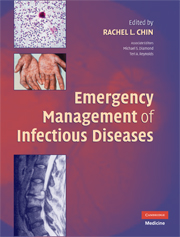Book contents
- Frontmatter
- Contents
- Preface
- Contributors
- Part I Systems
- 1 Infective Endocarditis
- 2 Myocarditis and Pericarditis
- 3 Dental and Odontogenic Infections
- 4 Systemic Diseases Causing Fever and Rash
- 5 Otitis Media
- 6 Otitis Externa
- 7 Sinusitis
- 8 Supraglottitis
- 9 Pharyngitis and Tonsillitis
- 10 Deep Neck Space Infections
- 11 Mumps
- 12 Peritonitis
- 13 Viral Hepatitis
- 14 Infectious Biliary Diseases: Cholecystitis and Cholangitis
- 15 Acute Infectious Diarrhea
- 16 Diarrhea in HIV-Infected Patients
- 17 Ulcerative Sexually Transmitted Diseases
- 18 Nonulcerative Sexually Transmitted Diseases
- 19 Vulvovaginitis
- 20 Male Genitourinary Infections
- 21 Adult Septic Arthritis
- 22 Hand Infections: Fight Bite, Purulent Tenosynovitis, Felon, and Paronychia
- 23 Osteomyelitis
- 24 Open Fractures
- 25 Spinal Infections
- 26 Prosthetic Joint Infections
- 27 Diabetic Foot Infections
- 28 Plantar Puncture Wounds
- 29 Periocular Infections
- 30 Conjunctival and Corneal Infections
- 31 Uvea, Vitreous, and Retina Infections
- 32 Community-Acquired Pneumonia
- 33 Tuberculosis
- 34 Influenza
- 35 HIV-Associated Respiratory Infections
- 36 Arthritis in the Acute Care Setting
- 37 Lower Urinary Tract Infection in Adults
- 38 Pyelonephritis in Adults
- 39 Fever and Headache: Meningitis and Encephalitis
- 40 Fever and Focal Cerebral Dysfunction
- 41 Fever and Acute Weakness Localizing to the Spinal Cord
- 42 Altered Mental Status in HIV-Infected Patients
- 43 Bacterial Skin and Soft-Tissue Infections
- Part II Pediatrics
- Part III Special Populations
- Part IV Current Topics
- Part V Overview of Antibiotics
- Part VI Microbiology/Laboratory Tests
- Part VII Infection Control Precautions
- Index
- References
5 - Otitis Media
from Part I - Systems
Published online by Cambridge University Press: 15 December 2009
- Frontmatter
- Contents
- Preface
- Contributors
- Part I Systems
- 1 Infective Endocarditis
- 2 Myocarditis and Pericarditis
- 3 Dental and Odontogenic Infections
- 4 Systemic Diseases Causing Fever and Rash
- 5 Otitis Media
- 6 Otitis Externa
- 7 Sinusitis
- 8 Supraglottitis
- 9 Pharyngitis and Tonsillitis
- 10 Deep Neck Space Infections
- 11 Mumps
- 12 Peritonitis
- 13 Viral Hepatitis
- 14 Infectious Biliary Diseases: Cholecystitis and Cholangitis
- 15 Acute Infectious Diarrhea
- 16 Diarrhea in HIV-Infected Patients
- 17 Ulcerative Sexually Transmitted Diseases
- 18 Nonulcerative Sexually Transmitted Diseases
- 19 Vulvovaginitis
- 20 Male Genitourinary Infections
- 21 Adult Septic Arthritis
- 22 Hand Infections: Fight Bite, Purulent Tenosynovitis, Felon, and Paronychia
- 23 Osteomyelitis
- 24 Open Fractures
- 25 Spinal Infections
- 26 Prosthetic Joint Infections
- 27 Diabetic Foot Infections
- 28 Plantar Puncture Wounds
- 29 Periocular Infections
- 30 Conjunctival and Corneal Infections
- 31 Uvea, Vitreous, and Retina Infections
- 32 Community-Acquired Pneumonia
- 33 Tuberculosis
- 34 Influenza
- 35 HIV-Associated Respiratory Infections
- 36 Arthritis in the Acute Care Setting
- 37 Lower Urinary Tract Infection in Adults
- 38 Pyelonephritis in Adults
- 39 Fever and Headache: Meningitis and Encephalitis
- 40 Fever and Focal Cerebral Dysfunction
- 41 Fever and Acute Weakness Localizing to the Spinal Cord
- 42 Altered Mental Status in HIV-Infected Patients
- 43 Bacterial Skin and Soft-Tissue Infections
- Part II Pediatrics
- Part III Special Populations
- Part IV Current Topics
- Part V Overview of Antibiotics
- Part VI Microbiology/Laboratory Tests
- Part VII Infection Control Precautions
- Index
- References
Summary
INTRODUCTION – AGENTS
The majority of otitis media (OM) infections are caused by organisms commonly found in the upper aerodigestive tract, including the ears, nose, sinuses, oral cavity, oropharynx, hypopharynx, and larynx. These agents include Streptococcus pneumoniae, Haemophilus influenzae, and less commonly, Moraxella catarrhalis, Streptococcus pyogenes, and Staphylococcus aureus. Anaerobic bacteria may play a role in OM in the neonatal period. Viruses that infect the upper respiratory tract also frequently cause OM.
EPIDEMIOLOGY
Young children compromise the majority of cases of OM. Children with craniofacial syndromes or trisomy 21 (Down syndrome) may be particularly prone to OM. Children with a cleft palate or submucous cleft palate are at high risk for persistent or recurrent acute OM.
Some adults also may be predisposed to OM, including those with HIV and concomitant adenoid hypertrophy that obstructs the eustachian tube orifice, as well as recipients of head and neck radiation. Additionally, certain ethnic groups, including Native Americans, have a higher incidence of OM. An otherwise healthy adult with persistent unilateral OM warrants additional work-up for a possible underlying malignancy.
CLINICAL FEATURES
Acute OM is one of the most frequently encountered otologic infections in children (Table 5.1). Young children may be inconsolable and will sometimes tug or pull on the affected ear, though this sign is very nonspecific in children under 2. They will often complain of pain or otalgia as a prominent symptom.
- Type
- Chapter
- Information
- Emergency Management of Infectious Diseases , pp. 33 - 36Publisher: Cambridge University PressPrint publication year: 2008

